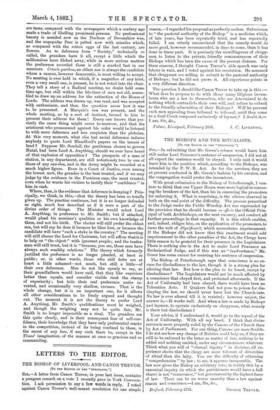THE BISHOPS AND THE RITUALISTS.
[To THE EDITOR OF THE "SPECTATOR.")
Sin,—In submitting that Mr. Green's release would leave him still under Lord Penzance's sentence of suspension, I did not at all expect the sentence would be obeyed. I only said it would leave him in the position which, according to the Bishops, was intended by the P. W. R. Act. As for the services, they are at present conducted in Mr. Green's fashion by his curates, and the congregation would prefer the incumbent.
With great submission to the Bishop of Peterborough, I ven- ture to think that our Upper House were more logical in censur- ing the breakers of the law, than his in censuring the promoters for enforcing it. What is surprising, is the silence observed in both on the real point of the difficulty. The process prescribed to the Judge under the Public Worship Act was superseded by the provision that he should become ex officio the Official Prin- cipal of both Archbishops, on the next vacancy, and conduct all further proceedings in that capacity. It is this which enables, and, indeed, obliges him, on the application of the promoters, to issue the writ of Significavit, which necessitates imprisonment. If the Bishops did not know that this enactment would add imprisonment to the other penalties of the Act, the Clergy have little reason to be grateful for their presence in the Legislature. There is nothing else in the Act to make Lord Penzance an Ecclesiastical Judge, and if this was an " inadvertence," Mr. Green has some excuse for resisting his sentence of suspension.
The Bishop of Peterborough says that conscience is no ex- cuse for disobedience to the law, though it is a strong plea for altering that law. But how is the plea to be heard, except by disobedience F The Legislature would not be much affected by a conscience that obeyed first, and protested afterwards. If the Act of Uniformity had been obeyed, there would have been no Toleration Acts. If Quakers had not gone to prison for dis- obeying the law, we should never have lost the Church-rate. No law is ever altered till it is resisted ; however unjust, the answer is,—It works well. And when a law is made by Bishops and laymen, to operate exclusively on clergymen, what remedy is there but disobedience ?
Your advice, if I understand it, would go to the repealof the Act of Uniformity. With all my heart. I think that divine service is more properly ruled by the Canons of the Church than by Act of Parliament. For one thing, Canons are more flexible. I do not see how any change of Rubrics could help us, if they are still to be enforced to the letter as matter of law, nothing to be added and nothing omitted, under any circumstances whatever. Think what you will of " clerical bigotry " in doctrine, all ex- perience shows that the clergy are more tolerant of diversities of ritual than the laity. You see the difficulty of obtaining " comprehension " by law ; to me, it appears insuperable. The law now gives the Bishop an arbitrary veto; to fortify this by a canonical inquiry (in which the parishioners would have a full share) is not "connivance," but government by the highest force of law. There can be no worse anarchy than a law against reason and conscience.—I am, Sir, dm,
Beeford, February 27th. GEORGE TREVOR.


































 Previous page
Previous page